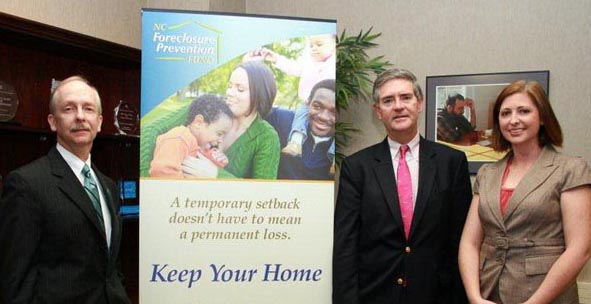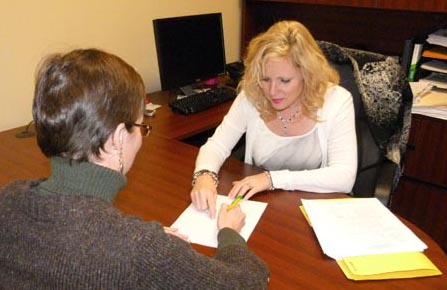Foreclosure Prevention
A loan program helps hard-hit homeowners pay a mortgage while they look for work.
By Connie Helmlinger
With the state's unemployment rate topping the national average, a new foreclosure prevention loan program is helping North Carolina homeowners who have lost their jobs in the downturn. Launched at the end of 2010, the N.C. Foreclosure Prevention Fund helps unemployed homeowners pay their mortgages while they get back on their feet. In its first year, it has helped more than 3,600 North Carolinians save their homes, and is adding new clients at the rate of 500 a month. The effort is expected to assist 21,000 North Carolina families before it ends in 2017.
Administered by the North Carolina Housing Finance Agency, the N.C. Foreclosure Prevention Fund pays the mortgage for unemployed workers while they seek jobs or complete job training in a new field. Other homeowners, who have gotten behind on their payments because of divorce, illness or other temporary hardship, may also qualify while they look for work.
"The goal is to help responsible homeowners who are struggling through no fault of their own, to protect their homes while they seek new employment," says A. Robert Kucab, executive director of the N.C. Housing Finance Agency. "Every foreclosure we can prevent helps the state's economic recovery by protecting property values and the local tax base."

N.C. Housing Finance Agency executive director Bob Kucab (left) and Congressman Brad Miller discussed the N.C. Foreclosure Prevention Fund with a North Carolina homeowner who is using the program to save her home while she seeks employment.
The N.C. Housing Finance Agency, a self-supporting public agency, has financed 201,000 homes and apartments in the last three decades, including 84,000 homes for first-time home buyers. It is guided by a 13-member board of directors, including Dean Carpenter of Dallas, who is president of the Rutherford Electric Membership Corporation.
North Carolina was one of 18 states and the District of Columbia chosen by the U.S. Department of the Treasury to participate in its "Hardest Hit" Fund because of high unemployment rates or falling home prices. "We had a head start," says Kucab, "because we were already operating a small, state-funded foreclosure prevention loan program that could provide the foundation of the new effort. We'd already built important partnerships with local housing counseling agencies, and we knew where many of the pot holes would be."
The North Carolina proposal became the model for many of the other "Hardest Hit" states.
Eligible homeowners (see "You May Be Eligible") apply for the program through one of 40 participating HUD-approved counseling agencies statewide or can apply online at www.NCForeclosurePrevention.gov. For homeowners who qualify, the housing agency makes monthly payments for mortgage, taxes, insurance and even homeowners dues, up to $36,000 or 36 months, directly to loan servicers. Afterward, the owners resume making their own mortgage payments. The help is provided as a zero-interest, deferred loan. If the owner continues to live in the home for at least 10 years, the loan is considered satisfied and no repayment is required.
Sherry Long, community development director at Western Piedmont Council of Governments in Hickory, has met many of the families her organization has helped apply for the loans. She says sometimes the assistance is brief, as in the case of single father in Alexander County who was unemployed for nine months. Even after he found a job that would enable him to pay his mortgage, he was in danger of losing his home because of past-due payments and fees. He qualified for a reinstatement loan from the N.C. Foreclosure Prevention Fund and kept his home.
Long says that, in the process of helping individuals, the N.C. Foreclosure Prevention Fund is helping local governments in her area by making sure property taxes are paid.

Laurie Powell, community development administrator at the Western Piedmont Council of Governments in Hickory, closes a foreclosure prevention fund loan.
"We've been able to sustain property values in many areas by preventing the foreclosures that would bring them down," Long notes. "We also see the benefit to local businesses — people are able to continue paying their power bills, pay for the kids' school lunches and make the car payments that enable them to search for a new job."
Long's organization serves Alexander, Burke, Caldwell and Catawba counties. She says her area has been particularly hard-hit, losing jobs — mostly in the furniture, textile and fiber optic industries — well before the rest of the state.
"We are back to the same employment numbers as 1990," she says. "We have lost 20 years of economic growth as a result of the recession, with not one new net job since then."
A self-employed man is another of Long's success stories. The owner of a cleaning service that specializes in physicians' offices, he saw his income cut in half when the recession hit and the doctors' office staffs began doing their own cleaning. A loan from the N.C. Foreclosure Prevention Fund is saving his home while he builds his business back by adding new clientele and offering new services.
Another is a Catawba County teacher's assistant and her construction-worker husband. The wife lost her job at the same time her husband had his income drastically reduced. They were close to losing their home when they came to Western Piedmont for help. The wife qualified for 36 months of mortgage payments from the N.C. Foreclosure Prevention Fund while she earns a teaching degree.
"We definitely see a lot of people trying to retrain for new jobs in this area," says Long, who notes that the parking lot at the community college is always full. "This program is a great way to protect a family's home and the property values in their neighborhood while they get back on their feet."
The N.C. Foreclosure Prevention Fund also offers loans to pay off second mortgages for homeowners who have found new jobs but are still unable to make their monthly mortgage payments because of reduced income. Paying off the second mortgage often reduces the homeowner's total monthly payments to a level they can afford. The assistance is a zero-interest, deferred payment loan of up to $30,000, plus all related fees.
Borrowers must have a good mortgage payment history for six months prior to the initial job loss or hardship. The loan is only paid back when the homeowner sells or refinances the home.
Homeowners do not need to be behind on their mortgage payments to apply for assistance. For more information about their eligibility, homeowners should call a participating counseling agency or the toll-free information line, (888) 623-8631, or go to www.ncforeclosureprevention.gov.
About the Author
Connie Helmlinger is a senior communication specialist with the N.C. Housing Finance Agency.-
Share this story:



Comments (2)
Lakisha |
July 26, 2023 |
reply
The North Carolina Housing Finance Agency offers assistance for those struggling with housing related costs as a result of the pandemic. Visit nchaf.gov or call 1-855-MY-NCHAF.
Read more here: https://www.carolinacountry.com/departments/more-power-to-you/support
Carolina Country |
July 27, 2023 |
reply